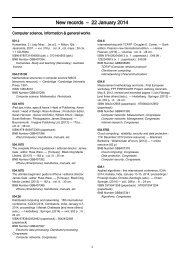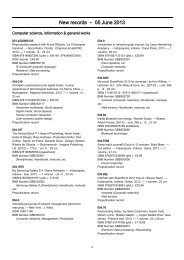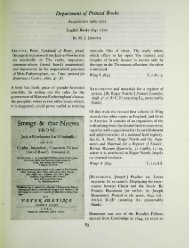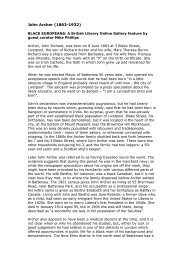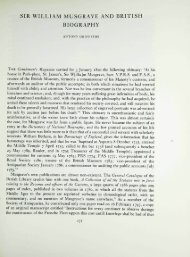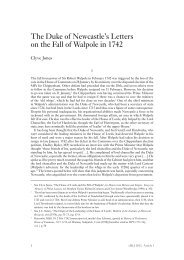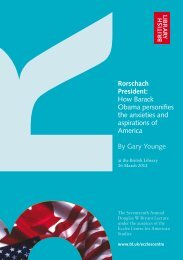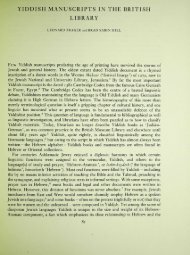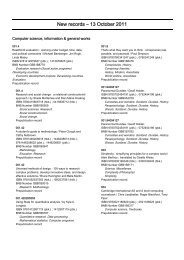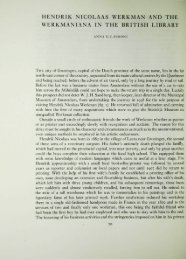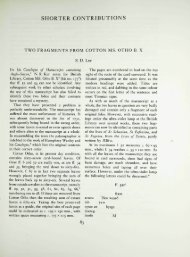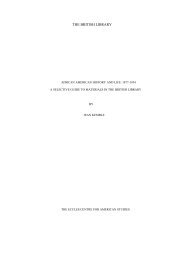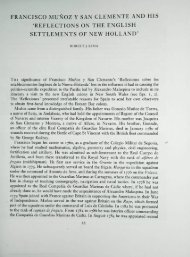A Medieval Psalter 'Perfected': Eighteenth-Century ... - British Library
A Medieval Psalter 'Perfected': Eighteenth-Century ... - British Library
A Medieval Psalter 'Perfected': Eighteenth-Century ... - British Library
You also want an ePaper? Increase the reach of your titles
YUMPU automatically turns print PDFs into web optimized ePapers that Google loves.
A <strong>Medieval</strong> <strong>Psalter</strong> ‘Perfected’: <strong>Eighteenth</strong>-<strong>Century</strong> Conservationism and an Early (Female) Restorer<br />
of Rare Books and Manuscripts<br />
Christianity, aged ‘spinsters’ of Chelsea, and Christ’s Hospital: to the last named institution<br />
she allocated the sizable sum of £7000, which ultimately the Hospital refused to accept. 19<br />
Denyer also endowed an annual prize for the best two sermons in theology composed by<br />
students at Oxford University, a prize which continues to be granted, under the title of the<br />
‘Denyer and Johnson Travelling Fellowship and Prize’. 20 For her benevolence, Denyer Street<br />
in Chelsea was named for Eliza in 1871, and to this day the street retains her name. 21 In<br />
the last years of her life, Eliza lived in Mecklenburgh Street, Chelsea, and upon her death<br />
in 1824, she was buried with her mother and father in Chelsea Old Church. Over all, the<br />
will that Eliza prepared depicts a woman with a considerable commitment to Christianity,<br />
education and philanthropy.<br />
One portion of Denyer’s will gives some insight into her investment in what was, for all<br />
intents and purposes, her father’s book collection. She parcelled out items in her library for<br />
three separate institutions and one individual: the <strong>British</strong> Museum, the Bodleian <strong>Library</strong>,<br />
The Church Missionary Society, and her friend and neighbour, Henry Virtue Tebbs:<br />
I give to the Trustees for the time being of the <strong>British</strong> Museum for the use of<br />
the public my quarto volume of English butterflies painted from nature, also<br />
my quarto manuscript Latin <strong>Psalter</strong> St Jerome translation, also the first edition<br />
of the Common Prayer book printed at Worcester by John Oswin in quarto in<br />
the year 1549, also the second edition printed at London in quarto by Edward<br />
Whytchurche in the year 1552, and another edition printed by Richard Grafton<br />
in the same year wanting the title page, the same to be subject to all the care rules<br />
and regulations of the said Museum.<br />
I give to the Trustees for the time being of the Bodleian <strong>Library</strong> in the<br />
University of Oxford such of the following books of which the said <strong>Library</strong> shall<br />
not at my decease already possess copies: namely, all my ancient printed Bibles,<br />
New Testaments and tracts of every description consisting of folio, quarto, octavo<br />
and duodecimo printed from the year 1491 to the year 1611, both inclusive the<br />
same to be subject to all the care, rules and regulations of the said <strong>Library</strong>. [...]<br />
I will and direct that all the remainder of my ancient Bibles, New Testaments and<br />
tracts printed prior to the year 1611 inclusive, by which I mean such of the said books<br />
as the Bodleian <strong>Library</strong> shall possess prior to my decease, shall be sold by auction<br />
for the benefit of the Church Missionary Society in Salisbury Court Ffleet Street.<br />
And I direct that the money arising by such sale shall be paid to the Treasurer for the<br />
time being of the said Society for the use of the said Society. I also give to the said<br />
Church Missionary Society for the use of said Society such part of the remainder of<br />
my <strong>Library</strong> as may be useful to their several missions, but it is my will that they do<br />
not take or remove from my dwelling house any of my books that will not be decidely<br />
[sic] useful for those purposes.<br />
19<br />
Denyer calculated for this refusal and willed that the same sum devolve to Mr Hetherington’s Charity for the<br />
Blind should Christ’s Hospital reject the funds; Hetherington’s Charity also rejected the bequest. I have been<br />
unable to determine exactly why the Hospital and Hetherington’s Charity did not accept the money, although<br />
it may have been owing to the extensive and elaborate conditions attendant on their acceptance. The ensuing<br />
court case is detailed in John Tamlyn (ed.), Reports of Cases Decided in the High Court of Chancery by the<br />
Right Hon. Sir John Leach, Master of the Rolls, vol. i (London, 1831), pp. 32-7. For more information, see<br />
Patricia E. C. Croot (ed.), The History of the County of Middlesex, vol. xii: Chelsea (London, 2004), p. 198.<br />
20<br />
For a description of the fellowship, see http://www.admin.ox.ac.uk/statutes/354-051b.shtml#_Toc28142703.<br />
Documents in the university archives record a drawn-out legal case before Oxford finally accepted the legacy<br />
on 2 April 1835. Initially it was twice rejected on the grounds that the conditions of the legacy were not<br />
in accord with university statutes. After the case was taken to court, William IV absorbed the funds and<br />
then directed the university to hold the annual prize, according to Denyer’s wishes. See Oxford, University<br />
Archives, WPα/35/1-4 and NW/ 17/7.<br />
21<br />
Gillian Bebbington, London Street Names (London, 1972), p. 110; B. R. Curles and P. K. Pratt, Kensington and<br />
Chelsea Street-Names: A Guide to Their Meanings (London, 1980), p. 9.<br />
8<br />
eBLJ 2013, Article 3




